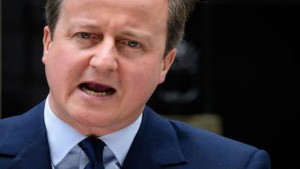 Prime Minister David Cameron is to step down by October after the UK voted to leave the European Union.Speaking outside 10 Downing Street, he said “fresh leadership” was needed.The PM had urged the country to vote Remain but was defeated by 52% to 48% despite London, Scotland and Northern Ireland backing staying in.
Prime Minister David Cameron is to step down by October after the UK voted to leave the European Union.Speaking outside 10 Downing Street, he said “fresh leadership” was needed.The PM had urged the country to vote Remain but was defeated by 52% to 48% despite London, Scotland and Northern Ireland backing staying in.
UKIP leader Nigel Farage hailed it as the UK’s “independence day”, while Boris Johnson said the result would not mean “pulling up the drawbridge”.Scottish First Minister Nicola Sturgeon said she was “absolutely determined” to keep Scotland in the EU so a second Scottish independence referendum was now “highly likely”.German chancellor Angela Merkel expressed “great regret” at the outcome, and EU chiefs said they expected the UK to begin negotiations to leave “as soon as possible, however painful that process may be”.
But Boris Johnson, the ex-London mayor and public face of Vote Leave who is now a front-runner to be next prime minister, said there was “no need for haste” about severing the UK’s ties.He said voters had “searched in their hearts” and the UK now had a “glorious opportunity” to pass its own laws, set its own taxes and control its own borders.
Another leading Leave campaigner, Labour’s Gisela Stuart, said the UK would be a “good neighbour” when it left the EU.The pound fell to its lowest level against the dollar since 1985 as the markets reacted to the results. It later regained some ground but was still 8% lower on the day by mid-afternoon.
Flanked by his wife Samantha, Mr Cameron announced shortly after 08:15 BST that he had informed the Queen of his decision to remain in place for the short term and to then hand over to a new prime minister by the time of the Conservative conference in October.He would attempt to “steady the ship” over the coming weeks and months, but that it would be for the new prime minister to carry out negotiations with the EU and invoke Article 50 of the Lisbon Treaty, which would give the UK two years to negotiate its withdrawal, he said.
“The British people have voted to leave the European Union and their will must be respected,” said Mr Cameron. “The will of the British people is an instruction that must be delivered.”Bank of England governor Mark Carney said UK banks’ “substantial capital and huge liquidity” allowed them to continue to lend to businesses and households.The Bank of England is ready to provide an extra £250bn of support, he added.
Chancellor George Osborne said he had briefed G7 finance ministers about the consequences of the vote.On Twitter, he said it had been a “hard-fought campaign” and while it was not the outcome he wanted, “I will do all I can to make it work”.The referendum turnout was 71.8% – with more than 30 million people voting – the highest turnout at a UK-wide vote since 1992.
Mr Farage – who has campaigned for the past 20 years for Britain to leave the EU – told cheering supporters: “This will be a victory for ordinary people, for decent people.”
Labour leader Jeremy Corbyn, who called for the UK to remain in the EU but was accused of a lukewarm campaign, said poorer communities were “fed up” with cuts and felt “marginalised by successive governments”.”Clearly there are some very difficult days ahead,” he said, adding that “there will be job consequences as a result of this decision”.He said the point he had made during the campaign was that “there were good things” about the EU but also “other things that had not been addressed properly”.
Meanwhile, at a press conference in Edinburgh, Ms Sturgeon said a second Scottish referendum was “on the table” and that the Scottish government would prepare legislation to enable one.The European Parliament is to hold an emergency session on Tuesday to discuss the referendum result.
On Twitter, EU Parliament president Martin Schulz called for a “speedy and clear exit negotiation”.But Leave supporting Tory MP Liam Fox said voters had shown great “courage” by deciding to “change the course of history” for the UK and, he hoped, the rest of Europe.
Britain is set to be the first country to leave the EU since its formation – but the Leave vote does not immediately mean Britain ceases to be a member of the 28-nation bloc.That process could take a minimum of two years, with Leave campaigners suggesting during the referendum campaign that it should not be completed until 2020 – the date of the next scheduled general election.
